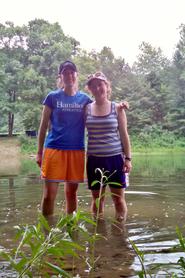
Courtney Smith ’86, P’16 has created several internship opportunities for Hamilton students this summer through the Greenbrier Valley Community Foundation in Lewisburg, W.V. As the executive director of the foundation, Smith contacted local nonprofits to see if any of the organizations would be interested in taking on summer interns. Several nonprofits responded to Smith and offered to host interns. Three Hamilton students—Meredith Garner ’15, Liz DaBramo ’15, and Medjine Lucien ’16—applied and were selected for these internships.
As Smith explained, “These [nonprofit] organizations cannot raise enough money through donations to hire people to run their programs. Accordingly, these agencies need highly qualified volunteers. I thought that this might be a good match for Hamilton students. The students could provide much-needed services while benefitting from the work opportunity: they would gain insight into how nonprofits implement and impact government policies as well as gain experience that would be valuable to their resumes.”
Garner and DaBramo secured internships at the Greenbrier River Watershed Association, an environmental non-profit that works with government agencies, other nonprofits and the public in order to protect the Greenbrier River and its watershed. The Greenbrier River, as DaBramo noted, is one of the longest rivers in West Virginia and its watershed spans 1,656 square miles.
The two students began their internship by working on an advocacy project aimed at encouraging Ronceverte, a neighboring town, to replace its sewage treatment plant. “The plant was too old to properly handle the quantity of waste and emitted fecal coliform bacteria and phosphates, which are a major contributor to algae growth,” DaBramo explained. “The Greenbrier River was already listed as impaired on the DEP's Clean Water Act because of excessive algae growth.”
Since the conclusion of the advocacy project (which DaBramo reported was a success) Garner and DaBramo have been contributing to several other projects. “I am doing a little bit of everything,” Garner said. “I’ve written a number of press releases and articles for the local newspaper, done some water sampling of the Greenbrier River, made a brochure about karst for a local cave company, and written and sent out letters to senators and delegates alerting them of the health problems of the local watersheds.” One of the largest projects Garner and DaBramo have been working on is the opposition to a 42”-wide natural gas pipeline that would pass through the Greenbrier River Watershed. DaBramo put the size of this proposed pipeline into perspective by noting that the Keystone XL pipeline is only 36”.
Both Garner and DaBramo highlighted how fascinating the internship’s environmental focus has been. Garner noted that learning about the public attitude toward environmental issues has been particularly eye-opening. “There are many problems stemming from mountaintop removal and the coal industry still heavily impacting the state; however, the public is very much uninformed and often in such poverty that they accept environmental degradation if it allows them to make a little bit more money or have a job.”
DaBramo plans to continue working with environmental concerns, perhaps examining pharmaceuticals in the water supply for her senior thesis in chemistry next year. She is also contemplating applying for a Watson Fellowship to examine nations’ responses to issues of declining water quality.
Lucien, meanwhile, is interning at the Child and Youth Advocacy Center (CYAC) in Lewisburg. The Center conducts forensic interviews and works with victims of abuse and their families to provide support and therapy.
She’s helping the Center create a uniform system for clients to apply for funding from the Crime Victims Compensation Fund. The Fund helps victims of abuse pay for therapy, so the Center hopes that a uniform system to apply to the fund will expand the therapy coverage the Center’s clients receive.
Lucien also sits in on forensic interviews, from which, she explained, “I have learned a lot about the types of abuse the victims have dealt with and the steps that are taken after a victim has disclosed any information regarding the abuse they've experienced.”
Lucien hopes to work at a nonprofit after graduation, so she is glad of her opportunity this summer to learn more about the nonprofit industry and the challenges small organizations like the CYAC face.
Smith has hosted two of the Hamilton students at her home this summer and arranged for the third student to stay with friends of hers. As she noted, “[The students and I] have been to the theater together, had dinner several times, and watched the World Cup.”
Smith hopes the students, as a result of their internships this summer, will gain an appreciation for the nonprofit industry as well as a better understanding of the intricacy of public policy issues. “For example,” Smith said, “the two students working for the Rivershed were involved with negotiations to create a new waste water facility. While cleaning the river is a priority, people in this area are poor and the added costs to their sewer bills will mean less food on the table.”
Ultimately, Smith would like Hamilton to implement a semester-long program in Lewisburg, similar to the Washington D.C. program. “Students would study public policy issues in education, housing, the environment, and with the elderly while they worked for organizations that were involved in these areas,” she explained. She believes the internships this summer are a good a first-step to establishing such a program.
